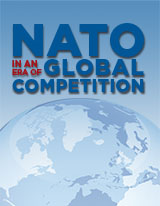At the Atlantic Council’s NATO in an Era of Global Competition conference, Jill Dougherty of the Harvard Kennedy School of Government and formerly of CNN, introduced a pressing question on the forefront of transatlantic policymakers’ minds: “What is the next crisis, and is NATO equipped to deal with it?” Juri Luik, Ambassador of Estonia to the Russian Federation and Robert D. Kaplan, Chief Geopolitical Analyst at Stratfor discussed how NATO should deal with the challenges that Putin is presenting, as well as their observations other potential geopolitical flashpoints the Alliance could be forced to confront in the near future.
Luik’s perspective from Estonia is that Putin is a “revolutionary leader of magnitude.” While he noted that the Russian economy is “weak,” he claimed that “the main threat is the Russian army.” In response, “NATO should be very clear and provide protection for allies by showing credible defense and readiness.” Luik argued that, despite any recent ebbs in fighting, the conflict in Ukraine is far from solved and “will continue for a long time.”
Kaplan asserted that Moldova was a borderland state at risk of becoming the next crisis between Russia and the transatlantic community. On the “arch of crisis” across the broader Middle East, Kaplan argued that many countries such as Yemen and Libya can no longer be called “states” because of their lack of central authority and control.
Kaplan also discussed the military arms race in the Far East over the South China Sea, claiming the disputes are over “national prestige.” He characterized East Asia as becoming a “real military theater of action,” which, though geographically distant, will still have profound impacts on transatlantic security.
Dougherty asked Luik if he trusted that NATO to come to Estonia’s defense in the event of an incursion by Russia? Luik responded affirmatively, but also added that “it depends on if we are serious about political will and honestly analyzing Russia.” He cautioned that the will to use troops matters much more than the total number of troops one has.
